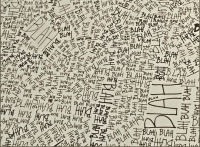Improving Student Expository Writing
In Texas we have a new state test called the State of Texas Assessment of Academic Readiness (STAAR) and some schools like mine, were surprised by the student poor performance in writing. As I was reviewing the low scores, I began thinking, "What else can I do to help my students write better?"
Later, I asked the same question to my son in-law, a graduate professor at Missouri State. His answer surprised me, but it makes sense. He responded, "Get the students to read more."
I thought some more about this, and I can see the wisdom behind those simple words. The question is, "What should they be reading?" My son in-law answered this question also, "They need to read the same type of things that you want them to write." So, there you have it. Our students were doing poorly on expository writing so they need to do more expository reading? Well, perhaps not. I'm not sure exactly what expository reading is but what the students need is to read more writing that is expository in nature.
Just getting students to read at all is a battle some times, but I definitely see the advantage of having the students read what they are going to then mimic in their writing. I might be able to sell the students on this kind of reading, if they know that they are going to do that sort of writing. Especially in expository writing, students have issues with two things: creativity, and literalness. Some students believe that they do not possess creativity, or possess it in enough quantity that they can "create" an expository paper.
Outside of the Box
Other students simply believe they have nothing to write about any subject. I believe that both problems (excuses) stem from the same issue: reality versus imagination (creative truth-telling).
If a student is given a topic upon which to write an expository paper, they have a definite format or process that they must use. They should have a thesis or main idea, they must give examples, supporting evidence or facts to support their opinions and they should have some sort of introduction and conclusion.
Some students get stuck with the thought in their heads, "I don't know anything about this topic! I do not have any experience with this subject! How can I write about it?" That is where the creative truth telling (imagination) comes to play.
In answer to an expository prompt, all the student has to do is follow the format, and other than making some sort of sense, and coherence, the content is irrelevant. So all they have to fabricate some content by asking themselves, "What if I did know something about this? What would I say?" "What if this really happened to me? What would I do?" Some times the most outlandish and obtuse responses are the best ones. They should have fun with it.
As long as they follow the format, anything they write does not have to be the exact truth, verifiable or even close to the truth. Mind you, this is for expository writing. Research reports and persuasive arguments should be truthful and verifiable, and you can help the students make the difference.
Moving the Line
Let's say the prompt was an experience that they had with their dog. So if they never had a dog, they can pretend that they did. Not only can they pretend, they can say it was a Great Dane. Not only was this dog huge, it believed it was a lap dog and constantly would sit on anyone who sat on the sofa. Then it would lick the face of their captive, just as a child licks a lollipop. You get the idea.
Then after they have written their interesting expository response, then they have other students read it. Once again, not necessarily for content, but that is the motivational part of this exercise, but for the format. They should use a sort of checklist to see if all of the necessary pieces are there: intro, evidence, transitions, and conclusion. They also can have a good laugh while reading for content. Put yourself in the place of the readers of standardized tests.
When an expository submission is the right format, engaging, and interesting, it would be like a breath of fresh air among all of the other stale and rigid paragraphs. I am very curious on ways you inspire your students to write (and read!)
